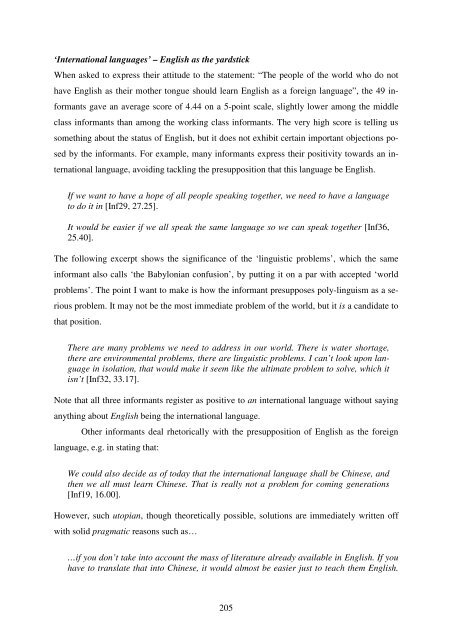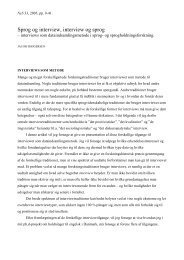Hør dog hvad de siger - Note-to-Self: Trials & Errors
Hør dog hvad de siger - Note-to-Self: Trials & Errors
Hør dog hvad de siger - Note-to-Self: Trials & Errors
Create successful ePaper yourself
Turn your PDF publications into a flip-book with our unique Google optimized e-Paper software.
‘International languages’ – English as the yardstick<br />
When asked <strong>to</strong> express their attitu<strong>de</strong> <strong>to</strong> the statement: “The people of the world who do not<br />
have English as their mother <strong>to</strong>ngue should learn English as a foreign language”, the 49 in-<br />
formants gave an average score of 4.44 on a 5-point scale, slightly lower among the middle<br />
class informants than among the working class informants. The very high score is telling us<br />
something about the status of English, but it does not exhibit certain important objections po-<br />
sed by the informants. For example, many informants express their positivity <strong>to</strong>wards an in-<br />
ternational language, avoiding tackling the presupposition that this language be English.<br />
If we want <strong>to</strong> have a hope of all people speaking <strong>to</strong>gether, we need <strong>to</strong> have a language<br />
<strong>to</strong> do it in [Inf29, 27.25].<br />
It would be easier if we all speak the same language so we can speak <strong>to</strong>gether [Inf36,<br />
25.40].<br />
The following excerpt shows the significance of the ‘linguistic problems’, which the same<br />
informant also calls ‘the Babylonian confusion’, by putting it on a par with accepted ‘world<br />
problems’. The point I want <strong>to</strong> make is how the informant presupposes poly-linguism as a se-<br />
rious problem. It may not be the most immediate problem of the world, but it is a candidate <strong>to</strong><br />
that position.<br />
There are many problems we need <strong>to</strong> address in our world. There is water shortage,<br />
there are environmental problems, there are linguistic problems. I can’t look upon language<br />
in isolation, that would make it seem like the ultimate problem <strong>to</strong> solve, which it<br />
isn’t [Inf32, 33.17].<br />
<strong>Note</strong> that all three informants register as positive <strong>to</strong> an international language without saying<br />
anything about English being the international language.<br />
Other informants <strong>de</strong>al rhe<strong>to</strong>rically with the presupposition of English as the foreign<br />
language, e.g. in stating that:<br />
We could also <strong>de</strong>ci<strong>de</strong> as of <strong>to</strong>day that the international language shall be Chinese, and<br />
then we all must learn Chinese. That is really not a problem for coming generations<br />
[Inf19, 16.00].<br />
However, such u<strong>to</strong>pian, though theoretically possible, solutions are immediately written off<br />
with solid pragmatic reasons such as…<br />
…if you don’t take in<strong>to</strong> account the mass of literature already available in English. If you<br />
have <strong>to</strong> translate that in<strong>to</strong> Chinese, it would almost be easier just <strong>to</strong> teach them English.<br />
205



